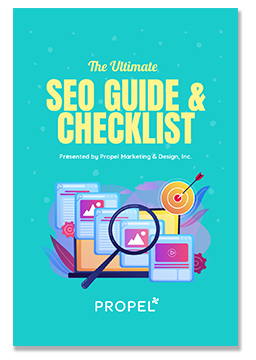Let’s talk about SEO (search engine optimization) for a minute. If you’re trying to make it in the big online world, SEO is mandatory for your online success.
So, what’s that mean?
It means if you want to rank on page one of Google and all of the search engine results pages (SERPs), or better yet, number one on Google (and all of the other SERPs), you’ve gotta work your SEO campaign like a boss.
Propel is here to give you the beginner’s guide to SEO success, so you can get your business ranking with the best of them.
We’ll go over:
- What SEO is and why you need it
- The importance of keywords
- The importance of content and optimizing it
- The importance of backlinks
- Why you should track your SEO progress
- The best SEO tools to aid you in your efforts
Let’s dive straight in…
What is SEO and Why Do I Need It?
SEO stands for search engine optimization. If you want your business to be seen on search engines such as Google, you need to create a website that both Google and your users like.
SEO is an ongoing project with excellent long term effects if it’s done properly, but know that when you implement SEO strategies, you won’t see huge, overnight results.
There are a handful of tasks you need to prioritize if you want to rank high on Google and get your brand noticed by the users who matter. Today we’re going to go over the most important steps when you’re just getting started to get your business ranking higher, beating your competitors, and finding the right audience for you.
Your Keyword Strategy
Your keyword strategy is… well, key. It’s imperative that you know HOW your customers are searching for you so you know how to optimize accordingly and actually get in front of them. So, how do you find this out? There’s a handful of ways, but the first one is the easiest- how would YOU look to find what you offer?
If you’re a yoga studio in West Palm, you may type in “yoga studio west palm”. This is the best place to start. Open Google and type in your query, but watch to see how Google gives you other options for your search. There’s some great feedback there. Review all the words that apply and keep track of them because those are going to be some of your keywords.
Maybe Google offers you “yoga studio west palm cheap”. Well, are you an inexpensive studio? If so, you may want to add that to your keyword list.
Also, think of the words that are specific to your brand or business. Maybe you offer childcare during your classes, or maybe you only teach high-intensity yoga. Keep in mind all the synonyms of your words that users may use instead, as well as singular and plural words.
Once you have a pretty good list together, you may want to use some keyword tools to help you out.
Here’s are some good tools (and some are free!):
- Google Keyword Planner
- Answer the Public
- SEMrush
- Ahrefs Keyword Explorer
- Keyword Tool
- Google Trends
- Moz’s Keyword Explorer
- Keywords Everywhere
- Ubersuggest
- KWFinder
So, now that you’ve got your keywords, let’s create some content around them…
Your Content (and Optimizing It)
If you’re new to SEO, you may not have heard that content is king. Now you have. Content is king. Even now with algorithm updates and numerous ways to contribute to your SEO campaign, content is still king.
Target your customers by using compelling, authentic, unique, interesting content to pull them in. This can be done with blogs, images, videos, website pages, etc., that’s right. Content doesn’t only consist of copy, images and videos will also help you rank higher on the SERPs, like Google, as long as you optimize them.
We’ll say it one more time for the folks in the back: remember to optimize every piece of your content for SEO. If you don’t do this, you’re missing out on some positive Google attention, making it more difficult for your buyers to find you.
Your Backlinks
Link building is a great way to build authority, provided the website linking to you is reputable and has its own authority. Google loves to see that distinguished and trustworthy websites link to your pages, it tells them that you also should have some recognition for being a “good” site. That recognition is paid by giving you a higher rank on their SERPs.
In the days of yore, you could cheat your way through this, but now that Google has fished out all the cheating ways, you need to use some elbow grease here.
A few ways to get reliable websites to link to your pages include:
- Write stellar content and the masses will come and ask you if they can link to you
- Ask sites you respect if they’re willing to link to you
- Write comments on others’ blogs THAT MAKE SENSE TO YOUR BRAND and add your link (this can look really spammy if you’re not careful and end up harming you, so be sure your comment is necessary, factual, and makes sense to your brand- yep, we said that part twice)
- Answer questions on query sites such as Reddit or Quora- you can also ask the question yourself and then answer it with your link in the answer
- Remember, if you host an event or give to a charity or are involved in the community, etc., your link could most likely be displayed on those websites, all of which will most likely be very reputable
Promoting your content on social media is a big win. Getting it shared will get you more business, more authority, more traffic- all of this leads to more rank.
Your Progress
The truth is, you won’t know how you’re doing if you don’t check, like, all the time. You may be doing really well and then all of a sudden see a sharp decline in your ranking.
With Google’s ever-changing algorithms, it’s important to remember that your SEO strategy is a loooooong game strategy and you need to stay on top of it constantly.
Even if it weren’t for algorithm updates, you still have competitors, bad links, stale copy, out-of-date videos, etc. to contend with.
Offering new and unique content regularly is going to benefit you well.
You should also be checking your data all the time.
There are tools to help you analyze how you’re doing and if you can’t do your own SEO audit, you may want to reach out to the professionals for this one.
Why?
Again, because knowing where you stand and what you’re doing right and what’s causing you to suffer is super important to your SEO strategy, therefore your ranking. You don’t have to guess your way through, no one has the time to do that anyway, so be sure you stay on top of this.
Knowing how to get and keep organic traffic coming to you and how to get the keywords that matter are a great place to start when you look at your metrics.
SEO Tools to Help
You don’t have to do all of this SEO work solo, in fact, we recommend implementing some tools to help you begin and manage your SEO campaign.
Here are a few great SEO tools that will deliver you some Google-love:
- Google Keyword Planner
- Google Analytics
- SEMrush
- Screaming Frog
- Ahrefs
- Link Research Tools
- Whitespark
- Google Search Console
- Advance Web Ranking
Your Beginner’s SEO Takeaway
Getting your specific buyer to your specific website is an art form you need to conquer. SEO can be challenging, that’s true, so don’t try to bite off more than you can chew straight from the start.
If you need to go back and optimize better on existing pieces of content, start there. Once you’ve completed that you’ll know what it takes for all of your new content to work in your favor and it will truly become like second nature to you.
If you take one thing away from this, make it keywords, keywords, keywords. But, it takes more than keywords to get to the top of Google: great content, optimizing, backlinks, to name a few.
We said at the top that it’s important both the search engines and your users find your site easy to use (user experience, which we didn’t talk about in this post, but is very important to SEO now), they must also believe you to be trustworthy, relevant, and of high-quality in order to push you up in the rankings.
Want more information on SEO?
Check out these Propel Marketing & Design blogs:
- 2020 Ultimate SEO Guide
- Winning at SEO – No Tech Wiz Necessary
- Writing for SEO
- Why Off-Page SEO is Important
- Why Your Website Isn’t Ranking
- Link Building for SEO
- The Technical SEO Checklist for the Not-So-Technical
- Ultimate Guide to Keyword Research for SEO










![How to Write a Professional Chiropractic Bio [Template Included]](https://propelyourcompany.com/wp-content/uploads/write-a-bio-500x383.jpg)

